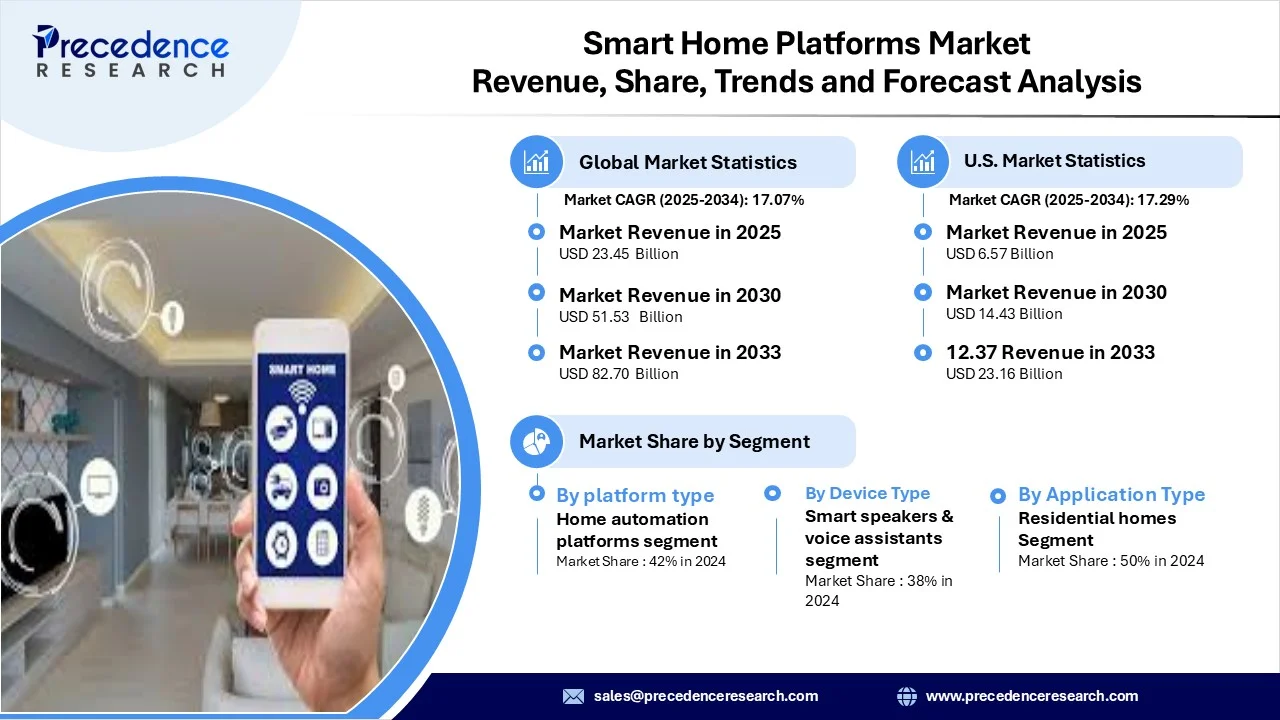Smart Home Platforms Market Revenue to Attain USD 82.70 Bn by 2033
Smart Home Platforms Market Revenue and Trends 2025 to 2033
The global smart home platforms market revenue reached USD 23.45 billion in 2025 and is predicted to attain around USD 82.70 billion by 2033 with a CAGR of 17.07%. The growth of the market is attributed to rising consumer demand for integrated, interoperable home control ecosystems that simplify device management, reduce energy waste, and boost security across connected living environments.

What are the key factors boosting the growth of the smart home platforms market?
The market for smart home platforms is experiencing significant growth due to several converging factors. Increased adoption of IoT and AI technologies enables smarter automation and predictive control within smart home platforms, attracting tech-savvy homeowners. Emerging interoperability standards like Matter are streamlining integration across different vendors, empowering homeowners to create mixed-device smart homes. Homeowners are increasingly turning to smart home platforms to address concerns about energy efficiency and rising utility costs. These platforms provide homeowners with centralized monitoring, facilitate demand response, and enable the scheduling or coordination of HVAC systems, lighting, and powered appliances.
Segment Insights:
- By platform type, the home automation platforms segment dominated the market in 2024 due to growing consumer demand for centralized control of multiple smart devices, such as lighting, HVAC, security systems, and appliances.
- By device type, the smart speakers & voice assistants segment led the market in 2024 due to their widespread adoption as central hubs for controlling other smart devices through intuitive, hands-free interaction.
- By component, the hardware/devices segment dominated the market in 2024, as hardware, including sensors, actuators, and gateways, forms the foundation of smart home platforms.
- By application, the residential homes segment dominated the market, since individual households represent the largest customer population for automation, energy management, security, and convenience use cases. The growing trend of home automation also bolstered the segment.
- By end-user, the individual consumers segment dominated the market in 2024 due to rising awareness and adoption of smart home technologies for enhanced convenience, security, and energy efficiency in residential settings.
Regional Insights:
North America dominated the smart home platforms market by holding the largest share in 2024, driven by strong consumer purchasing power, widespread broadband access, high smartphone penetration, and a well-established IoT infrastructure. The U.S., in particular, is a frontrunner in the early adoption of voice-assisted technology, with numerous energy-efficient initiatives and advanced smart security systems in place.
Asia-Pacific is experiencing the most rapid growth, fueled by rising disposable incomes, urbanization, and high smartphone penetration in countries like China, India, and those in Southeast Asia. Governments are actively promoting "smart cities" and subsidizing energy efficiency, further boosting adoption rates. Local device manufacturers are also offering affordable smart home solutions, which is encouraging widespread adoption in the developing markets across the region.
Smart Home Platforms Market Coverage
| Report Attribute | Key Statistics |
| Market Revenue in 2025 | USD 23.45 BIllion |
| Market Revenue by 2033 | USD 82.70 BIllion |
| CAGR from 2025 to 2033 | 17.07% |
| Quantitative Units | Revenue in USD million/billion, Volume in units |
| Largest Market | North America |
| Base Year | 2024 |
| Regions Covered | North America, Europe, Asia-Pacific, Latin America, and Middle East & Africa |
Smart Home Platforms Market Key Players
- Amazon (Alexa & Echo)
- Google (Google Home, Nest)
- Apple (HomeKit)
- Samsung SmartThings
- Huawei Smart Home
- Xiaomi (Mi Home)
- Bosch Smart Home
- Schneider Electric (Wiser Home)
- Honeywell Home
- ABB (Julius)
- Legrand
- Crestron Electronics
- Control4 (SnapOne)
- Ecobee
- Ring (Amazon)
- Logitech (Harmony)
- Somfy
- Arlo Technologies
- Vivint Smart Home
- Wink Hub
Recent Development:
- In April 2025, Samsung Electronics announced an update to its SmartThings platform, enhancing the AI Home experience with new features each quarter. Key improvements include integration with Samsung Health for better sleep environment personalization, expanded Calm Onboarding support for more devices, and compatibility with the Matter 1.4 standard.
(Source- https://news.samsung.com)
Get this report to explore global market size, share, CAGR, and trends, featuring detailed segmental analysis and an insightful competitive landscape overview @ https://www.precedenceresearch.com/sample/6895
You can place an order or ask any questions, please feel free to contact at sales@precedenceresearch.com |+1 804 441 9344